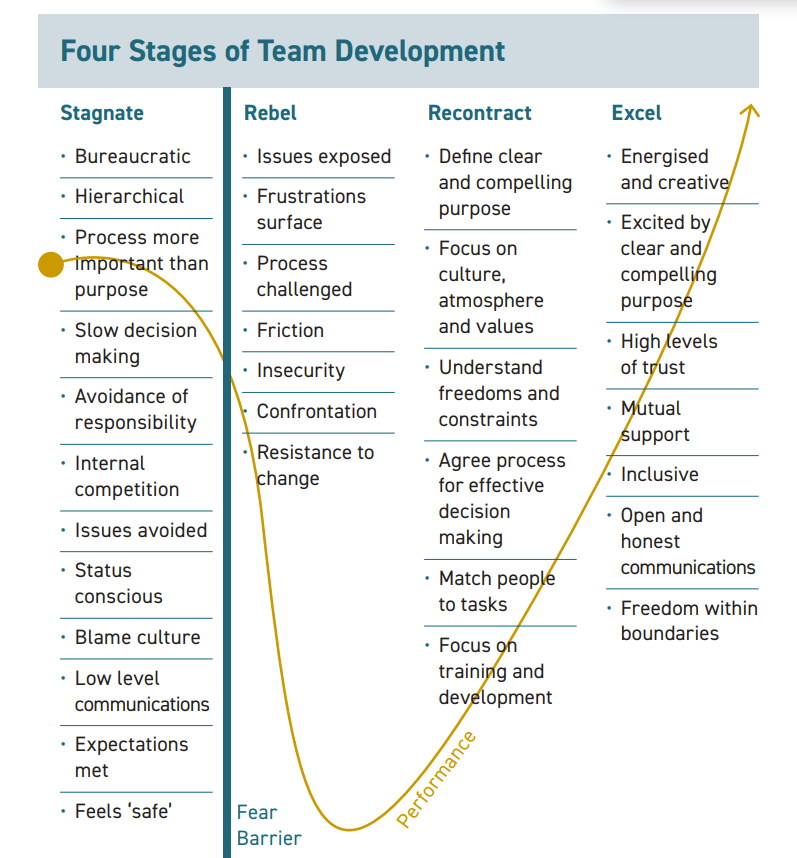Effective leaders engage others in pursuit of a clear and compelling purpose. In other words, leaders have their impact in the world through the effective and high performing teams they create. Team building and empowering others is a fundamental aspect of leadership. Without an effective team, leaders will find they are incredibly busy, carrying a lot of responsibility and stress and not having much impact.
 An effective framework for team performance development is Tuckman’s ‘Form to Perform’ model. It is a model which specialist leadership coach Neil Jurd, has adapted to include his own observations. His version of the model is called ‘Stagnation to Excellence’ and it includes a focus on Clear and Compelling Purpose, building a Mission Command Culture, and communicating at a high level. He uses this model a lot and is so passionate about it that he gets teased by other leadership and team development nerds. But it is simple, easy to understand, and gives a roadmap for improvement.
An effective framework for team performance development is Tuckman’s ‘Form to Perform’ model. It is a model which specialist leadership coach Neil Jurd, has adapted to include his own observations. His version of the model is called ‘Stagnation to Excellence’ and it includes a focus on Clear and Compelling Purpose, building a Mission Command Culture, and communicating at a high level. He uses this model a lot and is so passionate about it that he gets teased by other leadership and team development nerds. But it is simple, easy to understand, and gives a roadmap for improvement.
Teams seldom develop themselves, and a common misunderstanding is that they will naturally progress from left to right through each of these stages in their life cycle. This is not true; most teams get stuck in Stagnate and never leave. It takes leadership and a little courage to move a team to excel, and perseverance to keep it there. There is a natural gravitational pull that draws teams to Stagnate. This model shows you the cultural roadmap to excellence but, as a leader, you will need to get the engine started and navigate the journey.
There are 4 stages in this model of team development – Stagnate, Rebel, Re-Contract and Excel.
Stagnate
In this stage, bureaucracy, status, and hierarchy matter. Doing things ‘the right way’ is more important than getting things done. This is the triumph of Process over Purpose. Decision making is slow, with a complex drumbeat of meetings and layers of leadership. Throughout the organisation people prefer to avoid responsibility. There is internal competition and suspicion between people, and between departments. Most of the tension bubbles away beneath the surface, in unspoken rivalries and internal competition. The fridge in this organisation is likely to be plastered in passive-aggressive sticky notes addressing the theft of milk. Tension is only expressed in private conversations, or at home, where partners are subjected to a full account of everything that is wrong at work. This is not a happy place: people here count down the days to holiday or retirement, and political sharks thrive.
However, superficially, things feel safe and expectations are met. No more than expectations are met, but people tend to follow the rules and do exactly what they are told to do. This sort of organisation runs okay; it lacks everything which you find in Excel, but it is just good enough to get by, so people there tend to bide their time, whilst quietly looking at adverts for other jobs.
Rebel
If Stagnate is a form of organisational constipation, Rebel is the laxative which gets things moving, but not necessarily in a good way. As the name suggests Rebel can be a bit wild and a bit scary.
Rebel is usually cued by a change, often a new leader, or a change in circumstances that applies pressure to the organisation. In Rebel, people start exposing issues, demanding better and challenging the process. The result is usually friction, a feeling of insecurity, confrontation, and resistance to change. Rebel is an uncomfortable place.
A lot of leaders and teams will lose their nerve and retreat to Stagnate. People prefer the dull certainty of Stagnate to the risk of trying to move through Rebel. An effective leader will minimise the time that a team spends in Rebel by moving swiftly to Recontract. People sometimes ask if it is possible to skip Rebel; Jurd can’t reference his answer, but in his experience the answer is no. He has never seen a team develop without going through this stage, but sees that skilful leaders will move through to Recontract quickly. It usually requires a certain amount of moral courage to lead a team through this phase; it can be an exhausting environment for a leader. Having a strong sense of purpose will help, and coaching or mentoring relationships can also be useful to the leader in this situation. Leadership in Rebel can feel lonely.
Recontract
Here the team works out and agrees the fundamentals of what they are about, what they are trying to achieve and how they are going to work. They are setting out the structure for success. In this stage, a team defines the Clear and Compelling Purpose and creates and nurtures the right culture. They agree freedoms and constraints, decide on a way of quick and effective decision-making, ensuring the right people are in the right roles and have the right training. Often, this is a case of going back to basics and getting the foundations right.
It is easy for people and organisations and teams to think they are too busy for this; routine process usually distracts people from this essential groundwork. But Recontracting is essential to set the conditions for high-performance, and regularly stepping back to check that you have these basics right is an important way of preventing the organisation sliding back into the shallow end of the performance pool.
Excel
This is what you are aiming for when you are building a team. You will find that when most people are asked what sort of team they would like to be in, or to describe a successful team they have been in, this is what they describe. A team in Excel works in an energised and creative environment, where people are united and excited by a Clear and Compelling Purpose. There are high levels of trust and mutual support within the organisation. People feel included and they communicate openly and honestly; they are happy to talk about their emotions and feelings and express their opinions. In this sort of team there is the freedom to pursue ideas and projects, within agreed limits and as long as they clearly contribute to the overall purpose.
However, unless you work hard, your team is very unlikely to achieve Excel and will most certainly be stuck in the underachieving and turgid world of Stagnate.
Exercise
If you lead a team, explain this model to them and ask them where they would place themselves on this model. Then, as a team, discuss the results and consider what actions you can take to move towards or remain in Excel.
 Neil Jurd OBE is the author of The Leadership Book (priced at £15.99 and available from Amazon.co.uk) and founder of skills platform LeaderConnect. Find out more: www.leader-connect.co.uk
Neil Jurd OBE is the author of The Leadership Book (priced at £15.99 and available from Amazon.co.uk) and founder of skills platform LeaderConnect. Find out more: www.leader-connect.co.uk

